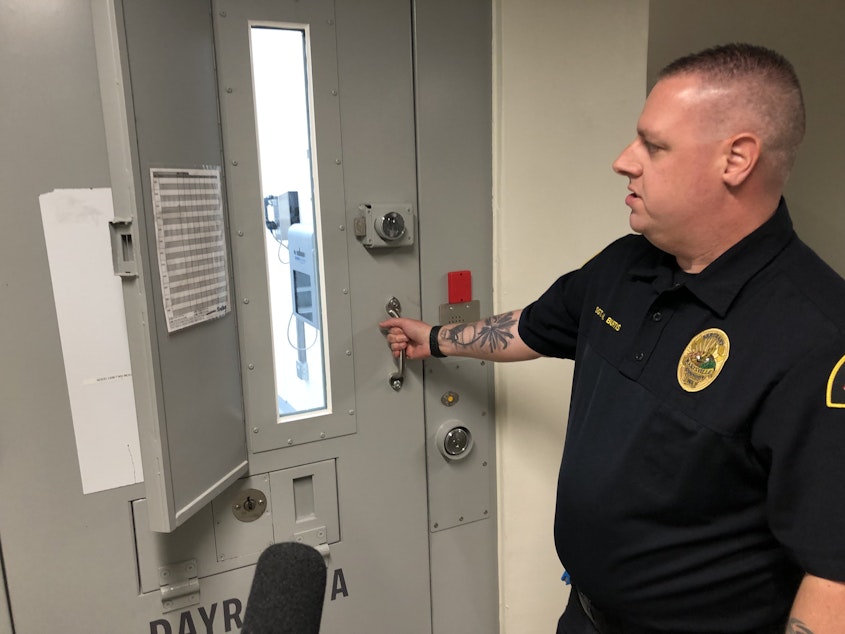Will WA’s new drug law help or hurt people struggling with addiction?

Washington has a new law on drug possession. Governor Inslee signed it Tuesday, just hours after lawmakers returned for a special session. It contains increased penalties for drug use and possession, and more funding for addiction treatment. Mayors say the language grants them the autonomy they needed, while proponents of "harm reduction" worry that cities will stymie their efforts amidst a crisis of drug overdose deaths.
The law, enacted in a matter of hours on Tuesday, is the state’s latest response to the 2021 Blake decision by the Washington Supreme Court, which struck down the state’s felony drug possession law as unconstitutional. It replaces a stopgap law that currently makes drug possession a misdemeanor and has not been vigorously enforced because it required police to refer someone to treatment at least twice before making any arrests.
The new law (SB 5536), much of which takes effect July 1, categorizes drug possession and public drug use as gross misdemeanors, but the maximum penalty is reduced to 180 days for the first two convictions. The law also contains tens of millions of dollars to help people seeking treatment.
Jon Nehring is the mayor of the city of Marysville. His city had passed its own drug ordinance when it seemed like state law might lapse. He said this new law isn’t everything he hoped for, but he does think it will help cities intervene when people use illicit drugs in public.
“The landscape you’ll hopefully see here is the treatment facilities and detox facilities get built and we have some accountability built in to really encourage — and really in some ways force — people to get into treatment,” Nehring said.
Proponents of harm reduction disheartened
Sponsored
Groups working to decriminalize drug use and reduce incarceration opposed the criminal penalties in the new law. The ACLU of Washington called it a huge step backwards, saying, "We cannot punish people into recovery."
Malika Lamont heads the technical support team for the state’s Law Enforcement Assisted Diversion program, one of three programs that will work with defendants to help them address their addiction and avoid jail under the new law. She said forcing people into treatment won’t work, and that “harm reduction,” which tries to help people reduce risky behaviors while granting them housing and other supports, is more effective than criminal penalties.
“We are flying in the face of best practice,” Lamont said. “Harm reduction is most researched and most effective [way] to engage people in the process of behavior change and towards recovery.”
The law does “encourage” courts to divert people away from jail, by referring them to programs where they can receive substance use assessments and then resolve their charge by accessing treatment or performing community service. It also allows people to get their conviction cleared if they complete treatment later. However, the law also allows prosecutors veto power over whether someone is eligible for diversion.
New law raises questions For Seattle
Sponsored
This spring, dozens of cities passed their own bans on drug use, or threatened to, to push the Legislature to take action. Their strategy was successful. Now the state’s gross misdemeanor law supersedes these city ordinances.
It’s not clear how the new law will apply in Seattle. City Attorney Ann Davison and City Councilmembers Alex Pedersen and Sara Nelson had proposed their own drug possession ordinance, and now want the council to make city code conform to the new state law. If the council declines, the City Attorney’s Office would likely not have jurisdiction to prosecute cases, nor would the Seattle Municipal Court have authority to adjudicate them under the state statute.
New funding allocated for treatment services
The law contains $63 million in funding for an array of priorities —from public defenders for people charged, to grants assisting people in recovery, to a pilot program for “health engagement hubs,” all-in-one locations where people using drugs can access services.
Gov. Inslee said, beyond this law, the state has earmarked about $600 million for behavioral health purposes this year. Some of the money comes from a settlement with opioid distributors that the state reached last fall.
Sponsored
Cities can regulate harm reduction services
The ability of cities to maintain control over the types of facilities that they host has been another big point of tension during these negotiations. Mayor Nehring of Marysville said he and other cities didn’t want the state law to force them to allow safe consumption sites.
“That’s something that just wasn’t the right thing for our community," he said. "We don’t believe there’s a safe way to consume fentanyl or other drugs.”
Lisa Daugaard, co-executive director for the nonprofit Purpose Dignity Action, said she hoped the law would shield outreach workers who test the drug supply or provide people with sterile drug-use supplies like syringes. The law does say those people "are acting legally." But then it gives cities the power to regulate and ban "harm reduction services concerning drug paraphernalia."
“I think the bill is at odds with itself in terms of purpose,” Daugaard said. “You can’t say that you’re taking a real step forward to tackle this crisis, and then put the people that have to do that frontline work in continued jeopardy.”
Sponsored
She said the state’s overall approach is still too reliant on incarceration.
“It’s still a war on drugs even if you have benevolent feelings toward people and you want to help them,” she said.
Overdose deaths continue to increase in Washington state. Statewide the number of overdose deaths nearly doubled between 2019 and 2021, according to the Washington State Department of Health. And the CDC says expected overdose deaths in Washington jumped more than 20% from 2021 to 2022.




